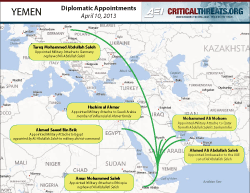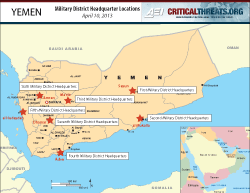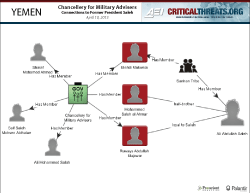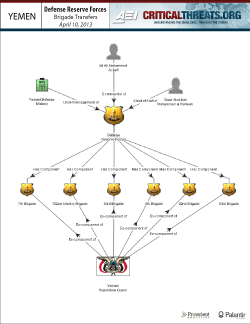{{currentView.title}}
April 11, 2013
A New Wave of Military Restructuring Decrees in Yemen
The United States relies on a partnership with the Yemeni government in conjunction with direct-action operations to combat the Yemen-based al Qaeda affiliate, al Qaeda in the Arabian Peninsula (AQAP). What is worrying about this partnership is that the Yemeni Armed Forces are hampered by corruption, disunity, and frequent mutinies. AQAP and its insurgent arm, Ansar al Sharia, took advantage of a severe security vacuum created by the political turmoil of the Arab Spring in 2011, seizing territory in southern Yemen. The transition of power in Sana’a, the capital, also set in motion a broader restructuring of Yemen’s security forces, which are shot through with strong patronage networks. A unified and professional local military is vital to combating AQAP and to reducing its safe havens in Yemen. President Abdu Rabbu Mansour Hadi issued a series of decrees over the past year that seek to restructure and professionalize Yemeni security forces, but the pronouncements have effected little change on the ground. The Yemeni National Transitional Government yesterday issued eight decrees that are aimed at restructuring and unifying this weakened Yemeni military. It will be important to watch whether powerbrokers within the security forces accept the new decisions and whether the Yemeni security forces become a truly reliable partner in the fight against AQAP.
The ailments of Yemen’s military are in large part a result of the rule of former President Ali Abdullah Saleh, who promoted those within his network to high military positions during his decades in power to strengthen his patronage network. Saleh and his network continue to exert influence in Yemen, and his continuing role in politics is a source of resentment. The main thrust of yesterday’s decrees is to further weaken Saleh’s network and that of the prominent Major General Ali Mohsen al Ahmar, who defected from the government during the Arab Spring and has since proved to be a spoiler in Yemen’s transition process. Jamal Benomar, UN Special Envoy to Yemen, has singled out Ali Abdullah Saleh and his relatives explicitly for their role in disrupting the transition process. Ahmed Saleh, Ali Abdullah Saleh’s son, and Ali Mohsen al Ahmar, who were removed from their positions as heads of the powerful Republican Guard and First Armored Division respectively on December 19, 2012, have now been given new positions. Ahmed Saleh will be the ambassador to the United Arab Emirates. Mohsen will be a military adviser to President Hadi, and the headquarters of the erstwhile First Armored Division are to be converted into a public park. Yesterday’s decrees have further eroded Ali Abdullah Saleh and Mohsen’s influence through new appointments and reassignments. The decrees are a strong blow to former President Saleh’s network in particular, striking at his relatives and allies.
The appointments raise a few questions, however. Foremost, will these decrees actually be enacted, and if so, wholly or partially? The December 19, 2012 decrees removing Ahmed Saleh and Ali Mohsen seemed to have negligible practical impact. Ahmed Saleh and Ali Mohsen have officially been out of their powerful military positions for months, yet have continued to control troops. Another concern involves the fact that several brigades have been reassigned and given new commanders. How will the brigades respond to these changes? Yemeni brigades, particularly those in the Republican Guard, are prone to mutiny when a command change decision comes through. Republican Guard troops have been mutinying already in al Bayda and Ibb over the past week, even as rumors of coming military changes were circulating through Yemen.
Another matter is that, even if the decrees are enacted, former President Saleh will still be the head of the General People’s Congress, the ruling party, and will remain in Sana’a. His recent issuing of an “organizational decree” and official visit to Saudi Arabia do not indicate a true willingness to cede power. Ali Mohsen may have been officially stripped of his camp and troops, but again, he remains in the capital. Both of these men will maintain the informal networks that have allowed them to be powerful figures in Yemen for decades.
The good news is that the decrees have the clear backing of the international community. Major General Ahmed Ali al Ashwal recently returned from a month of meetings in Washington, D.C., where he met with General Martin Dempsey and members of the General Staff in the annual Yemeni-American General Staff Talks. The decrees are already being warmly received by various foreign ambassadors, who call the move a step in harmony with the goals of the National Dialogue and Gulf Cooperating Council Initiative. Both Ahmed Saleh and Ali Mohsen have come out in support of the decrees. It is as yet unclear whether this will be enough to carry Yemen into the next phase of its military restructuring. The success of these decrees is essential to international interests in Yemen, as they directly affect the military’s ability to combat AQAP, which continues to pose a threat both domestically and internationally.
The Decrees: Breakdown
The eight decrees contain dozens of appointments. Here is what they have done:
1) Appointed Ali Mohsen al Ahmar, former head of the head of the powerful First Armored Division, to the post of military adviser to the president in matters of defense. Though Mohsen was in theory removed from the command of the First Armored Division in December 2012, he has not truly ceded control of the force, and indeed came out with an interview in March stating that he did not wish to leave power. The Division headquarters in Sana’a will be taken down, and the location of the camp, in central Sana’a, will be converted into a public park.
2) Appointed Ali Abdullah Saleh’s son Ahmed Ali Abdullah Saleh to an ambassadorship in the UAE. Ahmed Saleh, like Mohsen, once held a powerful position in the Yemeni military as head of the elite Republican Guard, dissolved by decree in December 2012. Units of the Republican Guard, however, continued to operate around Yemen, apparently still under the command of the dismissed Ahmed Saleh. Removing Ahmed from the country is a strong move to neutralize him as a local actor. Six former Republican Guard brigades were also transferred to Yemen’s Defense Reserve Forces, which will fall under the authority of a new commander, Major General Ali Ali Mohammed al Jaifi, and function under the Yemeni Defense Ministry.
 3) Assigned several members of former President Saleh’s network to foreign posts as military attaches.
3) Assigned several members of former President Saleh’s network to foreign posts as military attaches.
4) Appointed new regional commanders of the new seven Military Districts, announced in December 2012. The headquarters for the new commands have also been established. The commanders are prominent leaders in the Yemeni military, including a former district commander, former deputy chief of staff, and a former commander of Anad Base, Yemen’s largest air base in Anad, Lahij governorate. The new commanders are:
-
First Military District: Major General Mohammed Abdullah al Sumli, formerly commander of the 25th Mechanized Infantry Brigade in Abyan governorate
-
Second Military District: Major General Mohsen Nasser Qasim Hassan, formerly Adviser to the North-Western Military District
-

Third Military District: Major General Ahmed Saif al Yafa’i, formerly commander of the Middle Military District
-
Fourth Military District: Major General Mahmoud al Subaihi, formerly commander of Anad base and Anad Axis in Lahij governorate
-
Fifth Military District: Major General Mohammed Labuza, formerly Deputy Chief of Staff for Armament
-
Sixth Military District: Major General Mohammed Ali al Maqdashi, formerly Deputy Chief of Staff of the Army for Technical Affairs
-
Seventh Military District: Ali Mohsen Ali Muthana, formerly commander of the Missile Batteries Group (appointed December 19, 2012)
 5) Created and appointed members to a Chancellery of the Supreme Commander of the Armed Forces. Although several members of former President Saleh’s network have been removed by assignment to positions abroad, this new six-person committee that will directly advise the president has at least three members who have established connections to the former president.
5) Created and appointed members to a Chancellery of the Supreme Commander of the Armed Forces. Although several members of former President Saleh’s network have been removed by assignment to positions abroad, this new six-person committee that will directly advise the president has at least three members who have established connections to the former president.
6) Appointed new leadership in the Defense Ministry.
7) Issued appointments for twenty lower-level military positions, including brigade commands. Some of the brigades, such as the 22nd Armored and the 1st Mountain Infantry, are former Republican Guard brigades.

